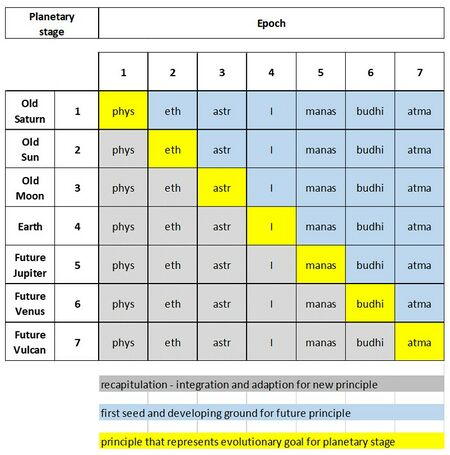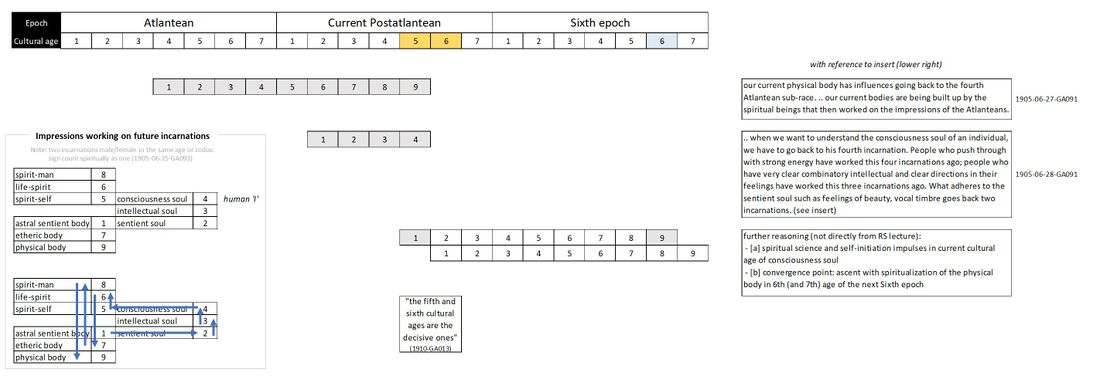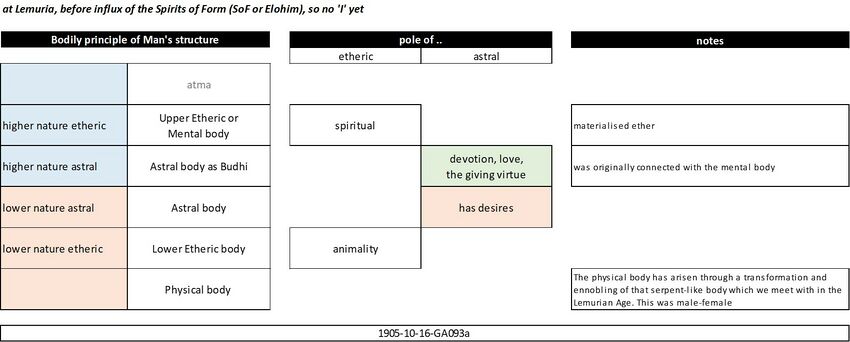Man's bodily principles
Man's structure as made up of bodily principles corresponding to the planetary evolutionary stages and spectrum of elements and ethers. These bodily principles are therefore of a different spiritual constitution, woven by spiritual beings at the different worlds or planes of consciousness.
Because on Earth we are on the fourth of seven planetary stages of evolution, we distinguish in Man's
- the inherent and latent structure, including higher principles that can be further developed through initiation, and that some individuals have matured ahead of the development for mainstream humanity
- the principles that all humanity already developed upto the current epoch and cultural age.
Therefore sometimes Man is called being with different 'multiplicity:
- a threefold being consisting of body, soul and spirit - a conception known as 'trichotomy'
- note, to avoid confusion: Man is also called a threefold being as Man is made up of three 'functional' subsystems
- a fourfold being because mankind developed four principles
- see also Pythagoras' Tetractys (also 1907-01-28-GA96 and 1906-11-08-GA055 below)
- a sevenfold if considering Man's full structure
- a ninefold being if counting the threefold soul as three elements, see also the Human 'I'.
The schema below illustrates it sounds more complicated than it it, but one needs to be fully familiar with this schema in order to not get confused.
Man's transformation and spiritualization consists of the transformation of the lower triad (of astral, etheric and physical bodies) to the higher triad (of spirit self or manas, life spirit or budhi, and spirit-man or atma).
Note the Man's bodily structure is different during incarnation and life between birth and death, compared to Structure of Man between death and a new birth. During incarnation he lives in the four bodily principles that he developed during death and a new birth. After death, Man sheds his physical, then etheric and finally astral body, and continues with the cleansed part of the astral body and the I. Then Man works with the higher spiritual hierarchies in the Spirit world and develops the new bodies for the next life. See more on Man's cycle of reincarnation
Aspects
bodily principles
- detailed topic pages: Human physical body, Human etheric body, Human astral body, Human 'I'
- for the threefold soul, see more on Human character - the I and threefold soul
- "in the consciousness-soul, the actual I-soul, is integrated the spirit-self or manas .. the spirit self (or manas) is enclosed in the consciousness soul" (1907-12-27-GA101)
- for the three highest and purely spiritual principles, see Man's higher triad
- for how these bodily principles develop in a human life, see Seven year rhythm
- note: how they develop will influence the individual waking consciousness, see - as a basis - Schema FMC00.647, and Man: an integrated view#Unbalances in the human bodily constitution and between Man's bodily principles
evolutionary perspective
- the dual structure of astral and etheric bodies (with higher and lower nature) arose as a result of the descent of the monads in the Lemurian epoch, see Development of the I. The higher and lower were at first not yet joined together; later they approached one another and became united. (1905-10-16-GA093A)
- the relationship between Man's level of consciousness and the kingdoms of nature can be mapped to Man's bodily principles: on Earth mineral, on Future Jupiter plant, on Future Venus animal, and Future Vulcan the I/Man (1907-12-27-GA101)
various other
- trichotomy: the Roman Catholic church declared by dogma that trichotomy is heretical and hence Man has a soul but no spirit - see topic page 869 and the 8th Ecumenical Council in Constantinople
- physical and etheric bodies need oxygen from the air; the I and astral body need nitrogen. Nitrogen is a substance which brings us into intimate connection with the spiritual world. It is the bridge to the spiritual world in the state in which our soul lives during sleep; without nitrogen our I and our astral body, when outside the physical body during sleep, could not exist (1922-07-02-GA213, see Mineral kingdom)
- Sevenfold harmony and inner experience
- the sevenfold nature of Man was taught in the Atlantean Mystery schools (Turanian adept school in fourth sub-race), where the sevenfoldedness was taught through the use of seven sounds, seven colours, and seven aromas .. so the principle that lives in sevenfold harmony would become an inner experience (1907-02-18-GA096 and also 1907-01-28-GA096)
- The seven bodily principles map to the seven petitions of the Lord's Prayer, see Schema FMC00.095
- The nine bodily principles can be linked to the Sermon on the Mount
Inspirational quotes
Pierre Teilhard de Chardin
We are not human beings having a spiritual experience; we are spiritual beings having a human experience
Buckminster Fuller (see also Schema FMC00.479A or FMC00.479 below, with reference to Schema FMC00.516)
Ninety-nice percent of who you are is invisible and untouchable.
Illustrations
Overview
Schema FMC00.086 shows the simplest overview of the constitution of Man's bodily principles, and how it can be referenced as 3,4,5,7 or 9 folded.
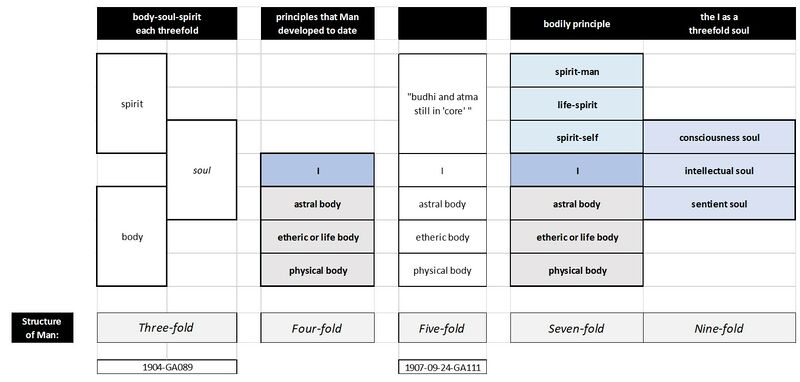
Schema FMC00.218 complements and expands on FMC00.086, showing the main planetary stage for the development of each bodily principle; and adding different terminology used in theosophy, jewish doctrine, and esoteric christianity.
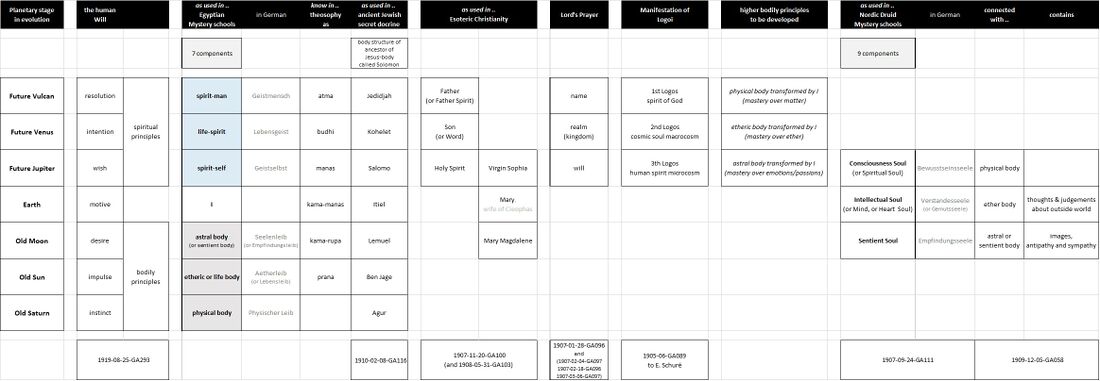
Schema FMC00.245 illustrates how the soul and spirit live in Man's bodily principles and I-organization. How the threefold soul activity and thinking feeling willing relates to the bodily organisms, and our contemporary waking consciousness is just a part of this. See also what contemporary mineral science calls 'the hard problem of consciousness', namely the fact that current human consciousness can not be explained by the purely materialistic mineral aspect of Man.

Evolutionary perspective
FMC00.218A is a drawing from Rudolf Steiner in a letter to Marie Steiner, showing the development of Man's bodily principles in the seven main planetary stages of evolution. It illustrates FMC00.218.
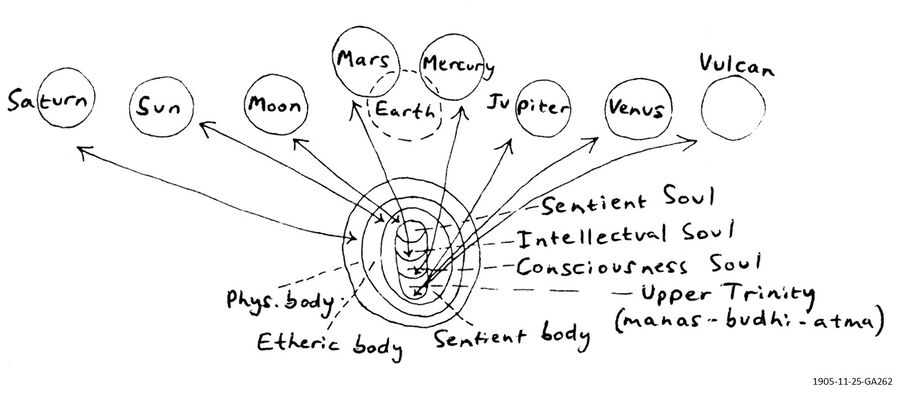
Schema FMC00.130: provides a simple tabular overview of evolution and the developmental goal per planetary stage of evolution (and Condition of Consciousness) - and epoch, shown in yellow. In grey is shown what was developed before is recapitulated so as be ready for a new development (in yellow).
Conditions of Life and Form are not shown here: take into account that each planetary stage only has a certain Condition of Life where a spiritual hierarchy such as humanity goes through the main and largest development potential in the lowest Condition of Form - see Schema FMC00.203. See also the related Schema FMC00.302 to get a feel for how cosmic breathing works across these evolutionary phases: there is always a preparatory phase, then a main phase of 'developmental traction', and a third phase of flushing and aftereffects.
Note: cohorts of the overall population that are developing ahead of this 'mainstream' evolutionary pathway require different conditions and hence develop on other planets. Only when conditions on Earth provide the conditions mapped to their developmental stage can they descend and incarnate again, see Planets hosting beings at various stages of evolution.
For humanity on Earth, the current fifth Postatlantean epoch has as developmental target spirit-self (or manas). For the next sixth epoch it is life-spirit (or budhi), and for the seventh epoch it is spirit-man (or atma). However only a limited cohort of the population will reach those targets in each epoch. The seed cohort for the next epoch is selected taking into account the developmental goal for the next epoch. See also Schema FMC00.486 and Man's transformation and spiritualization#1907-03-07-GA097.
Schema FMC00.286 shows the evolutionary dimension, and illustrates that one can not always assume intellectual logic of induction and deduction to hold in reality, as spiritual research shows.
The development of Man's subsystems did not develop along the sequence of Recapitulation as they were developed in the planetary stages, but actually in a more complex 'partial reverse recapitulation'.
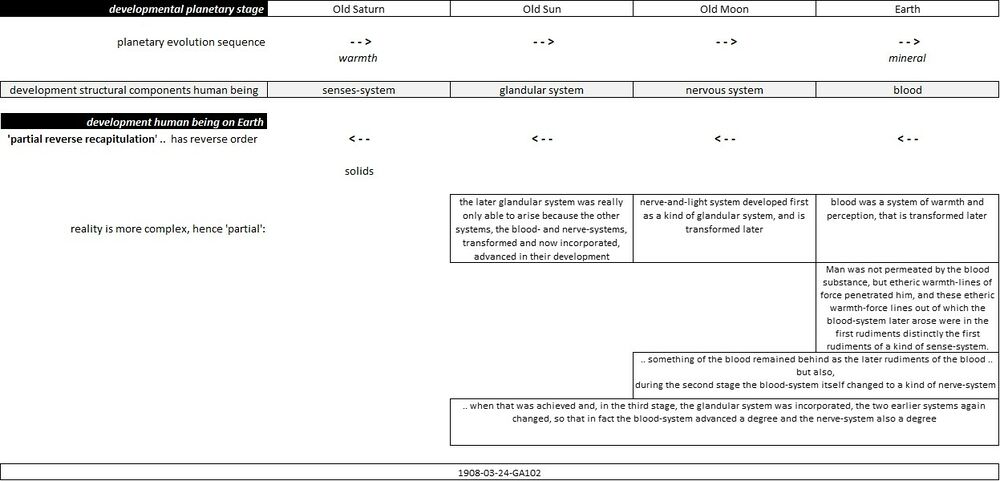
Schema FMC00.554: depicts,
on the lower left, an illustration of 1905-06-27-GA091 titled 'the evolutionary laws of inner karma'. It shows how our Earthly life and impressions influence the human being over multiple incarnations. When Man is able to actively work upon and use his intellectual soul, it has meaning for the third-following incarnation, and so on for all Man's bodily principles, now especially important for the higher self, see Man's higher triad.
This picture also 'explains' the importance of meditation and initiation, as the most valuable work carrying across into future incarnations.
As well as how before in ancient times and previous cultural ages, "the Mystery Centers were the places in which the form of external life belonging to the next cultural age was prepared." (1915-06-15-GA159)
On the right, underneath the time bar of epochs and cultural ages, are some statements illustrating this for our current fifth cultural age.
Below right is an addition (by the author), connecting to various statements by Rudolf Steiner about the fact that the fifth and sixth cultural ages are the decisive ones, and also about the spiritualization or ascent of humanity in the Sixth epoch (see Schema FMC00.505) and the Father impulse).
See also Schema FMC00.607 for the link with how the spiritual guidance of mankind used the principle below to managing the development of castes of souls with segments of the population at different levels of spiritual maturity.
Schema FMC00.278: visualizes the description in 1905-10-16-GA093A and the situation in the Lemurian epoch before the impuls of the Spirits of Form - see also Schema FMC00.137 - and how the upper and lower parts of the current human being merged into a new single dual structure with a higher spiritual and a lower physical part, with the resulting dual nature of the human astral body, see Schema FMC00.134. The dual nature is referred to as the human Centaur.
This 'descent of the monads' is an essential part of the process of Individuation through the use of separatedness in distinct physical body to grown the individual human 'I'. See more on topic pages Lemurian epoch and Development of the I
Meta schemes
FMC00.312 is a symbolic meta schema collating imagery on Man's bodily structure.
On the left: Man's bodily principles. During death and a new birth, Man's Human 'I' connects with the third hierarchy H3 and Man's higher triad.
On the right: This is depicted with the structure of Lord's Prayer, with fourfold Man on Earth below and Man's threefold spiritual self above.
In the middle is shown how the human 'I' uses the lower bodily principles to have a reality experience (see also Schema FMC00.289 and variants)
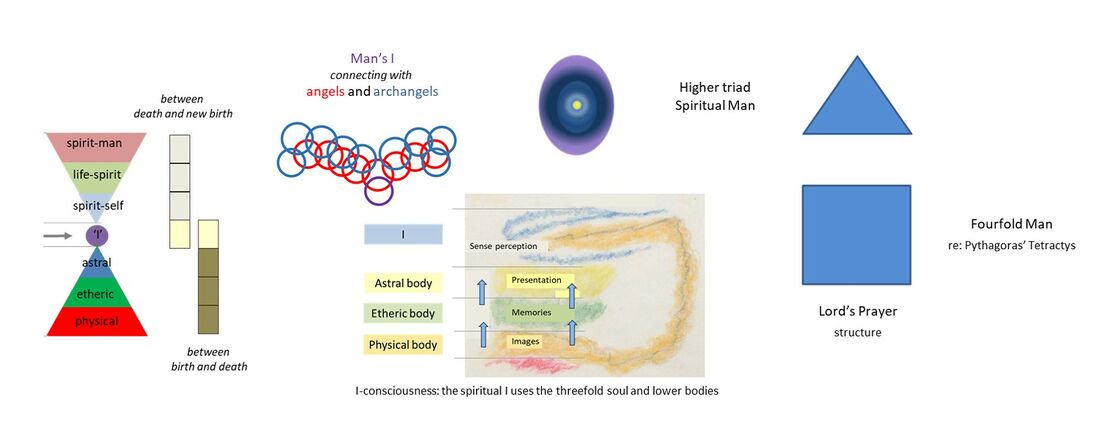
FMC00.312A is the version of Schema FMC00.312 with the references of the various Schemas that are collated. These can be studied individually so as to merge the perspectives they offer and integrate them in your soul work.
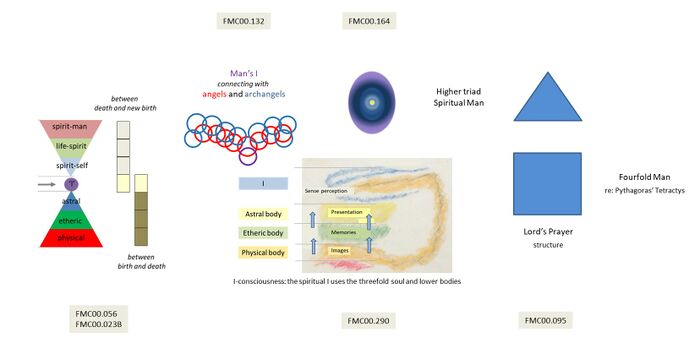
Man lives in three worlds
Schema FMC00.479 illustrates how Man lives in the three worlds. On the right is shown how the worlds interpenetrate and Man lives in all three worlds.
On the left is the typical spiritual scientific concept drawing of Man's bodily principles, whereby it requires deeper study to detach from the limitations of the conceptual representation and grasp the realities it represents. In the middle, as a way of mapping or transposing between both, is shown how both the formative forces of the Elementary Kingdoms (EKi) and all spiritual beings involved to generate our reality experience in the physical world called the Cosmic fractal, whereby the spectrum of elements and ethers .
Quote from 1919-12-14-GA194: " We cannot say that other worlds than the sense world do not concern us; we are in their midst. We must realize that, while we are walking about here on this Earth, we walk through the spiritual worlds exactly as we walk through the physical air."
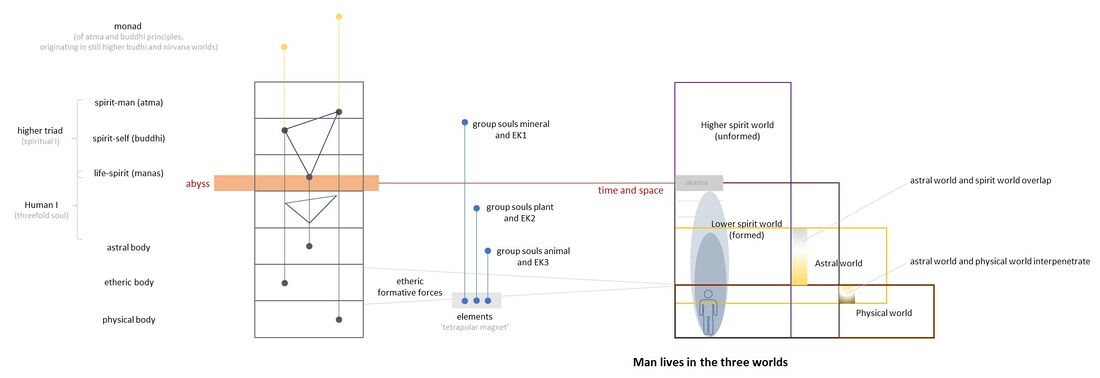
Schema FMC00.479A is a densely written narrative to the responsibility of Man as a Free Man Creator contribution to the future development of the cosmos (see also Seeds for future worlds). It requires us to see ourselves as more than our body in the physical world, as per mineral science and the contemporary worldview where first the spirit, and now the soul is being eradicated. In today's world Man's meaning of life is left without higher purpose or ideals in a materialistic worldview of the cosmos, with dramatic implications for each individual soul and humanity as a whole.
The goal of this website is to support souls to emancipate oneself from this through education into spiritual science and the Christ Impulse, and the study of the site contents should let some light into the cracks.
Notes:
- the terms in bold in the text below are topic pages on this website, for further study
- for a more elaborate version of the drawing with explanations, see Schema FMC00.479
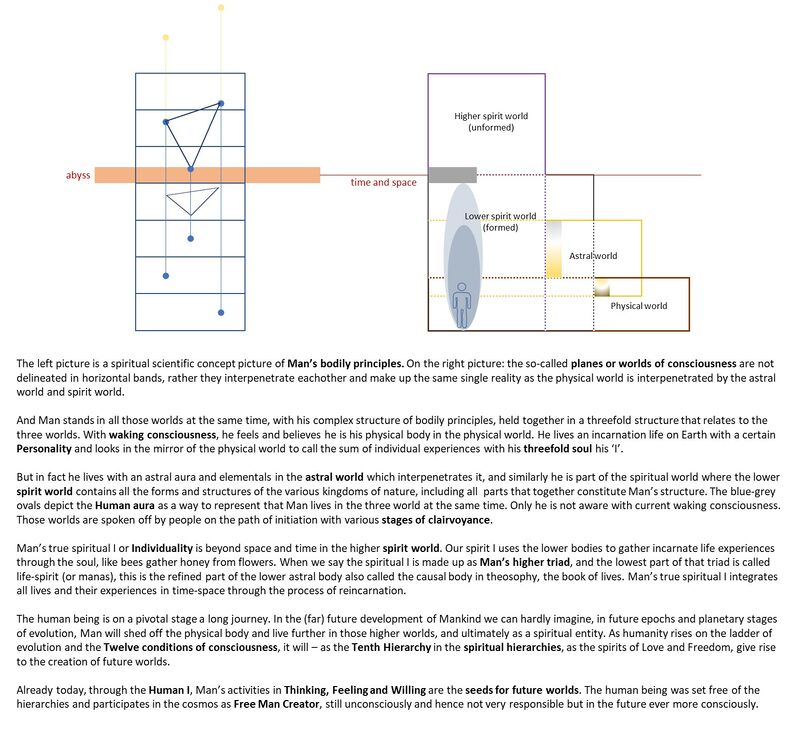
Lecture coverage and references
Overview coverage
Man's bodily principles are described in very many lectures.
For an introduction and overview, see for example 1905-06-20-GA091 or 1922-04-30-GA212
Reference extracts
1905-06-20-GA091
1905-06-27-GA091
Note: the below is a un-edited internet translation
Sensory perception, the power to see and hear, depends on the sensory body. Our contact with the environment is related to our sensory perceptions, how much of it we can take in, whether we have a well-organized ear or eye or not. Our perceptions are regulated by this. How much we can absorb into our inner being in a lifetime depends on this. The sensory body is only important for one incarnation of the human being between birth and death; it has no influence on the immediately following incarnation.
Now the sentient soul sends its indriyas into the perceptions. It is something more fleeting how the human being processes the impressions. This impresses itself on the sentient soul; this has significance for the next incarnation.
Something even higher is the impression that man makes on his intellectual soul - as a memory, a feeling of how to enjoy something in the intellectual soul, and this has significance for the third incarnation. So that man with the construction of his higher senses belongs only to the present, but what he processes with them goes into other incarnations.
Those who process little will bring nothing into the next incarnation through themselves; the other will add something from within himself that has a lasting effect. Let us think of such people as leading individualities. He who works little can be implanted with little. Through the receptive intellectual soul, the achievements are taken into the future.
What the human being works into the consciousness soul continues into the fourth incarnation. Concepts belong to the consciousness soul; so that concepts which are apparently innate are acquired before [four] incarnations.
Now even the highest concepts, as we experience the divine, enter the spirit-self and have an effect in the fifth incarnation.
Then one can calculate how to lead humanity as an initiate. If theosophy is to emerge in the fifth sub-race, this divine must emerge in the fifth preceding race. "Those whom I can now influence through my Rishis will then be ripe to receive the same in concepts", said the Manu to himself.
What a person develops in his life spirit through meditation, he takes over into his sixth incarnation.
And when he has learned to influence his etheric body through meditation, he takes what he has learned as chela into the seventh incarnation.
When the spirit-man is trained, he enters the eighth incarnation.
And the master works on the ninth incarnation.
Thus we see that higher beings have had an influence on the etheric body for seven incarnations, and on our physical body powers from the fourth Atlantean sub-race through nine incarnations. Therefore, the present bodies are built up by the spirits that once influenced the Atlanteans.
We thus see the working of the inner karma and will understand what the Manu did when he prepared in the fifth sub-race of the Atlanteans - Ursemites - the little cluster that became the next tribal race. Something had to be prepared that could work after the sixth - Akkadians - and the seventh sub-race of Atlanteans - Mongols - had passed, during four incarnations. After four incarnations, what emerges is what has been implanted in the consciousness soul: the I.
The initiates calculated the future plan of human beings according to this scheme.
1905-10-16-GA093A
describes the double structure of the astral and etheric bodies as a result of the descent of the monads in the Lemurian epoch (see Development of the I), and also states (here short key sentence added for reference, as this aspect is not often described).
Fundamentally it is a .. two-fold formation: we have to differentiate in it a lower and a higher nature. ... They were at first not yet joined together; later they approached one another and became united.
for quote and link, see quote B on:
Human astral body#1905-10-16-GA093A
1906-11-08-GA055
The Pythagorean 'quadrature' [editor: see Tetractys] is nothing else than the four-foldness, physical body, etheric body, astral body and 'I'.
Those who have occupied themselves more deeply with spiritual science know that the I works out from itself what we call Spirit-Self (or Manas), Life-Spirit (or Budhi), and the actual Spirit-Man (or Atma). [see Man's higher triad]
1907-01-28-GA096
is on the Lord's Prayer which also has a sevenfold structure. At the end this lecture also makes reference to the sevenfold harmony, as in 1907-02-18-GA096
1907-12-27-GA101
for full lecture, see: Group souls of humanity#1907-12-27-GA101
In modern Man we have the following structure:
- the physical body, the etheric or life body, and the astral body;
- then the sentient soul, which is as if embedded in it, is intimately connected with the astral body;
- then the mind or intellectual soul
- and the consciousness soul; and again in the consciousness-soul, which is the actual I-soul, integrated the spirit-self or manas.
This is roughly how we would have to imagine the people of today.
..
Let us now consider the relationship between our soul, that is, our sentient soul, our intellectual or emotional soul, our consciousness soul and the spirit self (or manas) enclosed in the consciousness soul, to our etheric body.
1907-02-18-GA096
.. mentions that the sevenfold nature of Man was one of the things that was made known in the Turanian adept school (in the fourth and middle sub-race of the Atlantean epoch), where the sevenfoldedness was thought with the use of seven sounds, seven colours, and seven aromas all on a scale .. the principle that lives in sevenfold harmony would become an inner experience.
Reference to this is also made at the end of 1907-01-28-GA096 on the Lord's Prayer.
1912-11-25-GA244 Q&A 234.1
from page 422
... for example, has been described by me saying: "The physical body and the etheric body lie in bed and the astral body and the I move out. "
How must we take something like this?
First of all as an image; as an image it is correct. As strange as it may sometimes sound that this image is based on a fact, it is nevertheless a fact.
Nevertheless such answer is only very one-sided. It is possible that you describe the exact opposite by saying: In waking, the I and the astral body are in a certain respect outside the physical body.
Only when the images become experience will one arrive at the truth. It would be the greatest error to believe that what is so rigid applies to the spiritual realm as it does to the sensual realm, so that things can be drawn with such sharp contours. That is not the case.
Things in the humanities must be characterized from all sides; therefore the humanities are not comfortable. And in no other field would it be so out of place to make pocket editions of books as here. You could write all the right things in them, but still not spread the truth. It's not something you can memorize once and for all. You need time to get to grips with things.
And in these lectures, as they are given here, this is always taken into consideration. It is illuminated from different angles, not with such sharp contours as you can in science.
It is precisely the sharp outline that does not lead to the truth, but the fluctuating one does.
And so the answer to this question must be that the etheric body penetrates the physical body at all points, protruding a little on all sides. This is so true for the spiritual eye that it can be seen like anything else for the physical eye. But there are already limits set by his subjective vision. When the vision is further developed, one realizes that the etheric body goes much further, that it is in connection with the whole cosmos. In a way, the physical body pulls the etheric body together. And this is even more the case with the astral body, which appears like a cloud that penetrates the physical body.
1922-04-30-GA212
1924-03-01-GA353
... describes how the various cultures in the current epoch 'discovered' the different bodily principles:
- Indians - physical body
- Egyptians - etheric body, hence there special link with water
- Babylonians - astral body
- Jews - I
1924-02-02-GA234
also see: Human 'I'#1924-02-02-GA234
good general introductory lecture, linking the four main bodily principles to the spectrum of elements and ethers, and the stages of clairvoyance
full lecture extract below, partially parsed and SWCC
I have described how Man must be regarded as composed of physical, etheric and astral bodies, and how we can acquire a deeper insight into this composition by exercising our cognitive powers — powers of mind, heart and will — in a certain way. This composition that we discern in Man is also found in the external world. Only, we must be clear that there is a consider-able difference between what we find in the world outside and what we find in Man.
[physical world and body - mineral element earth]
When, to begin with, we study the physical world — and we can really only study its solid, ‘earthy’ manifestations — we come to distinguish various substances.
- .. the anatomist, investigating what remains of the living Man as a corpse after he has passed through the gate of death need not take account of any but earthly substances which he also finds outside Man. At least, he believes he need not, and within certain limits his belief is justified. He investigates the elements or the salts, acids and other compounds found outside of Man, and he investigates what the human organism contains. He does not find it necessary to enlarge his physical and chemical knowledge.
Indeed, the difference only becomes apparent when we study these things on a somewhat bigger scale, and notice what I have emphasized so strongly, namely: that the human organism as a whole cannot be maintained by external Nature, but is subject to destruction.
.. in the solid, earthy, physical realm, we do not find very much difference between what is outside and what is inside Man. We must recognise a greater difference however, in what is etheric.
[etheric]
I have drawn your attention to the way the etheric really looks down on us from the world beyond the Earth. .. from out of the etheric, everything, whether it be a large or small drop, is made spherical, and this tendency to spherical formation, due to the complex of etheric forces, extends to the etheric body of Man.
We have really to fight continually to overcome this tendency in our etheric body. Of course, all this takes place in the subconscious.
In its present form the human etheric body is closely moulded to the physical body. It has not such sharp boundaries and is mobile in itself; nevertheless we can distinguish a head part, a trunk part and, indistinctly, limb parts where the etheric body becomes diffuse.
Thus, when we move an arm the etheric body, which otherwise conforms to the human shape, only protrudes a little beyond the arm, whereas below it is widely extended. But it has from the cosmos the tendency to take on spherical form.
The higher being of Man — the astral man and the I — must oppose this tendency and mould the spherical form to the human shape. So we may say: Man, as an etheric being, lives in the general etheric world by building up his own form out of the etheric, whereas the formative tendency of the surrounding etheric is to give spherical form to what is fluid. In Man what is fluid takes on human form, and this is due to his inner forces opposing the external, cosmic forces.
[astral]
This opposition is still stronger in the astral Man. As I indicated yesterday, the astral comes streaming in from the indefinite, so to speak.
- In the earthly realm outside Man it streams in (arrows in green circle) in such a way that it develops the plant form out of the Earth; and the plant form clearly shows this response to the astral. The plant has only an etheric body, but it is the astral forces which draw the plant out of the Earth.
Now the human astral body is extraordinarily complicated and one really perceives it in the way I described yesterday, i.e. as an inner musical element, a whirling, weaving life, an inner activity and all one might describe as music inwardly sensed. But everything else that is astral is discovered streaming in centripetally; it is transformed into the human astral form, whereby complicated things appear.
Let us say, for example, that something astral is streaming in from this side. The human being moulds it to the most varied forms in order to make it serviceable and incorporate it. One might say, the human being wins his astral body by subduing the centripetal astral forces.
[etheric & gravity]
Now, when we turn our psycho-spiritually sharpened gaze to the cosmos, we do gain the conception of the etheric as described, but we also receive the impression that it is due to the etheric that we strive away from the Earth. While we are held to the Earth by gravity, we tend away from the Earth because of the etheric. It is the etheric that is active in this centrifugal tendency.
- In this connection you need only think of the following: The human brain weighs approximately 1,500 grammes. Now a mass with this weight, pressing on the delicate blood vessels at the base of the brain, would quite compress them. If our brain actually exerted its 1,500 grammes weight in the living Man we could not have these blood-vessels. In the living Man, however, the brain weighs twenty grammes at most. It is so much lighter because it floats in the cerebral fluid and loses in weight by the weight of fluid displaced. The brain really strives away from man; and in this tendency the etheric is active. Thus we may say that it is just in the brain that we can see most clearly how matters stand. Here is the brain floating in its fluid, whereby its weight is reduced from 1,500 to about twenty grammes. This means that its activity shares, to a remarkably small degree, in our physical, bodily life. Here the etheric finds tremendous scope for acting upwards. The weight acts downwards but is reduced. In the cerebral fluid there is principally developed the sum of etheric forces that lifts us away from the Earth. Indeed, if we had to carry our physical body with all its forces of weight, we would have a sack to drag about. Every blood corpuscle, however, swims and is reduced in weight.
- This loss of weight in a fluid is an old piece of knowledge. You know, of course, that it has been ascribed to Archimedes. He was bathing one day and noticed, on lifting his leg out of the water, how much heavier it was than when in the water, and exclaimed: Eureka! I have found it. He had discovered that every body in a fluid loses in weight the weight of the fluid displaced. Thus, if you think of Archimedes in his bath, here his physical leg and here the same leg formed of water, then the physical leg is lighter in water by the amount that this water-leg weighs. It is lighter by just this amount. Likewise the weight of our brain in the cerebral fluid is reduced by the weight of a mass of cerebral fluid of the size of the physical brain. That is, it is reduced from 1,500 to 20 grammes.
In physics this is called ‘upthrust’, and here the etheric acts.
The astral, on the other hand, is stimulated — to begin with — by breathing, whereby the airy element enters the human organism and eventually reaches the head in an extremely attenuated state; in this distribution and organisation of the air the astral is active.
[recap]
Thus we can really see in the solid earthy substance the physical; in the fluid, especially in the way it works in man, the etheric; in the airy, the astral.
It is the tragedy of materialism that it knows nothing of matter — how matter actually works in the several domains of life. The remarkable thing about materialism is just its ignorance of matter. It knows nothing at all about the way matter works, for one does not learn this until one is able to attend to the spiritual that is active in matter and is represented by the forces.
[etheric (and astral) influences]
Now, when one progresses through meditation to the ‘imaginative’ knowledge of which I have already spoken, one finds the etheric at work in all the aqueous processes of the Earth. In the face of real knowledge it is childish to believe that all that is at work here — in the sea, in the rivers, rising mists, falling drops and cloud formations — contains only what the physicist and chemist know about water. For in all that is out there in the mighty drop of the ‘water-earth’, in what constantly rises in the form of vapour, forms clouds and descends as mist, in all the other aqueous processes — water plays, indeed, an enormous part in shaping the face of the globe — in all this etheric currents are working. Here is weaving the ether revealed to one in ‘pictures’ when one has strengthened one's thinking in the way I have described.
Everywhere behind this weaving water the cosmic ‘imagination’ is weaving, and the astral ‘music of the spheres’ plays everywhere into this cosmic imagination, coming — in a sense — from behind.
[Man perceived clairvoyantly - etheric body]
In Man, however, all these conditions are found to be quite different from what they are outside him. If one looks, with clairvoyant vision at what is outside Man, one finds the world built up in the following way:
To begin with, there is the physical, in direct contact with the Earth; the etheric, which fills the whole cosmos; then the astral, which streams in as living beings. indeed, it is no merely general, abstract, astral weaving that we behold, but actual beings entering space, beings of a psycho-spiritual nature just as Man, in his body, is also a psycho-spiritual being. This is what one beholds.
If we now look to Man, we find in him, too, an etheric body corresponding to the external etheric. But this etheric body is not perceived in such a way that you can say: there is the physical Man, and here is his etheric body. Certainly, you can draw it so, but that would only be an arrested section. You never see merely the present etheric body; this section which you can draw is seen to be continuous with what has gone before. You always see the whole etheric body extending back to birth. Past and present form a whole.
- If you have a twenty-year-old person before you, you cannot see merely his twenty-year-old etheric body; you see all that has happened in his etheric body back to birth and a little beyond. Here time really becomes space.
- It is just as when you look down an avenue and see the trees drawing closer and closer together on account of perspective; you see the whole avenue in space.
Likewise you look at the etheric body as it is at present but see its whole structure, which is a ‘time-structure’.
The etheric body is a ‘time-organism’, the physical body a ‘space-organism’. The physical body is, of course, self-contained at any given moment; the etheric body is always there as a totality which comprises our life up to the given moment. This is a unity.
Hence you could only draw or paint the etheric body if you could paint moving pictures; but you would have to be quicker than the pictures. The momentary configuration that you draw or paint is only a section and is related to the whole etheric body as the section of a tree-stem to the whole tree. When you draw a diagram of the etheric body, it is only a section, for the whole etheric body is a ‘time-process’. Indeed, on surveying this time-process one is led beyond birth, even beyond conception, to the point where one sees the human being descend from his pre-earthly life to his present life on Earth, and, just before he was conceived by his parents, draw together etheric substance from the general cosmic ether to build his etheric body.
Thus you cannot speak of the etheric body without surveying Man's life in time back to birth and beyond. What one regards as the etheric body at some definite moment is only an abstraction; the concrete reality is the time-process.
[astral body]
It is different again with the astral body. This is apprehended in the way I described yesterday. I can only draw it diagramatically, and in the diagram space must become time for you. [drawing, not reproduced/available]
- Let us assume we are observing the astral body of a person on the 2nd February 1924. Let this be the person. He does indeed make this impression upon us: Here is the physical body, here his etheric body. We can also observe his astral body and this makes upon us the impression I described in my book Theosophy. But when one comes to the really ‘inspired’ knowledge which appears before empty consciousness, one attains the following insight. One says to oneself: What I am observing as the astral body of this person is not really present today, i.e. on the 2nd February 1924. If the person is twenty years of age, you must go backwards in time — let us say, to January 1904. You perceive that this astral body is really back there, and extends still further back into the unlimited. It has remained there and has not accompanied him through life. Here we have only a kind of appearance — a beam. It is like looking down an avenue; there, in the distance, are the last trees, very close together. Behind them is a source of light. You can have the radiance of the light here, but the source is behind — it need not move forward that its light may shine here.
So, too, the astral body has remained behind, and only throws its beam into life. It has really remained in the spiritual world and has not come with us into the physical. In respect to our astral body we always remain before conception and birth, in the spiritual world. If we are twenty years old in 1924, it is as if we were still living spiritually before the year 1904 and, in respect to our astral body, had only stretched forth a feeler.
- That, you will say, is a difficult conception. Well, so it is. But you know there was once a Spanish king who was shown how complicated the structure of the universe is. He thought he would have made it simpler. A Man may think like this, but, as a matter of fact, the world is not simple, and we must exert ourselves somewhat to grasp what Man is.
To look intently at the astral body is to look directly into the spiritual world. (Only in the world external to Man have you around you what is astral.) When you look at human beings spiritually, you look into the spiritual world in respect to their astral bodies. You perceive directly what a Man has undergone in the spiritual world before he descended to Earth.
But, you will say, my astral body is active within me. Of course it is. But imagine some being or other were here, and by means of cords mechanically connected, were to produce some effect at a considerable distance away. It is like that with respect to time. Your astral body has remained behind, but its activities extend through the whole of your life. Thus the activity that you notice in your astral body today has its origin in a time long past, when you were in the spiritual world before descending to Earth. That time is still active — in other words, it is still there, as far as the spiritual is concerned.
- Anyone who believes that the past is no longer ‘present’ in the real time-process resembles a Man in a railway train to whom one might say: That was a beautiful district through which we have just passed, and who would reply: Yes, a beautiful district. But it has vanished; it is no longer there. Such a Man would believe that the district through which he had passed in an express train had disappeared. It is just as stupid to believe that the past is no longer there. As a matter of fact it is always there, working into man. The 3rd of January 1904, is still there in its spiritual constitution, just as what is spatial remains after you have travelled through it. It is there, influencing the present.
Thus, if you describe the astral body as I have done in my Theosophy, you must realise, in order to complete your insight, that what is active here is the ‘radiance’ of something far back in time. The human being is really like a comet stretching its tail far back into the past.
[parenthesis]
It is not possible to obtain true insight into Man's being unless we acquire these new concepts.
People who believe one can enter the spiritual world with the same concepts one has for the physical world should become spiritualists, not anthroposophists. Spiritualists endeavour to conjure the spiritual — only somewhat thinner than ordinary matter — into the ordinary space in which physical men walk about. But it is nothing spiritual — only fine exudations. Even the phantoms described by Schrenck-Notzing are only fine, physical exudations which retain in their shape traces of the etheric. They are mere phantoms, not something really spiritual.
If you study the world and Man in the way I have described you will realise the presence of the higher worlds in external nature. In the case of mMan, a study of the successive worlds will lead you at once to the ‘time-process’ within him. In his case, however, you can go further still and reach a domain which our philistine materialistic age will not recognise as accessible to knowledge.
[stages of cognition .. -> inspiration and love required to know the real human I]
I have referred to perception, by the senses, of the coarse, tangible physical objects around us as the first stage of cognition.
The second stage was that of ‘strengthened thinking’ in which we apprehend the living, moving images of the world.
The third kind of cognition was ‘inspiration’ in which we perceive the beings that express themselves through these images — hear a kind of music of the spheres that sounds from beyond. In the case of Man we are led, not merely out of the material world, but out of the present into his pre-earthly life — into his existence as a psycho-spiritual being before descending toEarth. This ‘inspired’ knowledge is attained by emptying our consciousness after strengthened thinking.
The further stage in cognition is attained by making the power of love a cognitive force.
- Only, it must not be the shallow love of which alone, as a rule, our materialistic age speaks. It must he the love by which you can identify yourself with another being — a being with whom, in the physical world, you are not identical. You must really be able to feel what is passing in the other being just as you feel what is passing in yourself; you must be able to go out of yourself and live again in another.
- In ordinary human life such love does not attain the intensity necessary to make it a cognitive force. One must first have attained ‘empty consciousness’, and have had some experience with it. And then we undergo what many who are striving for higher knowledge do not seek: we suffer what may be called the pain of knowledge. If you have a wound somewhere, it hurts you. Why? Because, owing to the wound, your spiritual being cannot permeate your physical body properly at the place concerned. All pain comes from not being able, from one cause or another, to permeate the physical body. And when something external hurts you, this is also because you are unable to ‘unite’ yourself with it — to accept it.
- Now, when one has attained the empty consciousness into which there flows an altogether different world from that to which one is accustomed, then, for such moments of inspired cognition, one is without one's whole physical Man; this is then one large wound and hurts all over. One must first undergo this experience; one must endure the leaving of the physical body as actual pain and suffering in order to attain inspired knowledge. Of course, an understanding of such knowledge can be acquired without pain, and people should acquire this understanding apart from suffering the pain of initiation. But to acquire an immediate, spiritual perception — not a mere understanding — of what works into Man from his life before birth, that is, of what he leaves behind in the spiritual world, one must cross the abyss of universal suffering and pain.
- We can then experience the above identification with, and coming to life in, another being. Only then do we learn the highest degree of love which consists not in ‘forgetting oneself’ in a theoretical sense, but in being able to ignore oneself completely and enter into what is not oneself. And only when this love goes hand in hand with that higher — inspired — cognition are we really able to enter the spiritual with all the warmth of our nature, with all our inwardness of heart and mind; that is, with our soul forces. We must do this if we are to progress in knowledge. Love must become a cognitive force in this sense. When such love has attained a certain height and intensity, you pass through your pre-earthly life to your last life on earth; you slip over, through all you have undergone between your last death and your present life, into your former life on earth — into what we call previous incarnations.
Now, it was, of course, also in a physical body that you then trod the Earth. But nothing remains of all that made up that physical body; it has been absorbed into the elements. Your innermost being of that time has become entirely spiritual and lives in you as spirit alone.
In truth, our I, in passing through the gate of death and the spiritual world to a new life on earth, becomes wholly spiritual. It cannot be grasped with the ordinary powers of every-day consciousness; we must intensify the power of love in the way I have described. The Man we were in a previous life is just as much outside us as another human being of today. Our I has the same degree of externality. Of course, we then come to possess it — to experience it as ourself — but we must first learn to love without any trace of egotism. It would be a terrible thing indeed, if we were to become enamoured — in the ordinary sense — of our former incarnation. Love, in the highest sense, must be intensified so that we may be able to experience our former incarnation as something quite other than ourself. Then, when our cognitive power emerges through the empty consciousness, we acquire knowledge through love intensified in the highest degree, and reach the fourth member of Man — the I proper.
[recap bodily principles]
- Man has his physical body through which he lives at each moment in the present physical Earth.
- He has his etheric body through which he lives continually in a time-process extending back to a little before his birth, when he drew together this etheric body out of the general cosmic ether.
- He has his astral body through which his life extends over the whole period between his last death and his last descent to Earth.
- And he has his I through which he reaches back into his previous life on Earth.
Thus, when we speak of the various members of Man's being we must speak, in each case, of his extension in time.
[human I - warmth organism]
We bear our former I-consciousness within us today, but unconsciously. How?
If you want to study how you must realise that Man, here in the physical world, is not only a solid body, a fluid man and an airy man, but an organism of warmth as well. This is also the way to approach the I.
- Everyone knows this, at least in a very partial way. If we measure a person's temperature we get different degrees of fever in different parts of the body. But there are different temperatures throughout Man's whole organism. You have one temperature in your head, another in your big toe, another inside your liver, another within your lung.
- You are not only what you find drawn in definite outlines in an anatomical atlas. You have a fluid organism in constant motion. You have an organism of air which permeates you continually, like a mighty, symphonic organism of music. And, in addition, you have a surging organism of warmth, differentiated with respect to temperature. In this you yourself live. Indeed, you feel that this is so. After all, you are not very conscious of living in your shin-bone, or in any other bone, or in your liver, or in your vascular fluids. But you are very conscious of living in your warmth, though you do not distinguish between your ‘warmth-hand’, ‘warmth-leg’, ‘warmth-liver’, etc. Nevertheless this differentiation is there, and if the temperature differences proper to the human warmth-organism are absent or disturbed, we feel this as illness, as pain.
When, with developed consciousness, we attain the picture stage — ‘imagination’ — we perceive the etheric as weaving pictures.
When we perceive the astral, we hear the music of the spheres which sounds towards us or, we might say, from out of ourselves. (For our own astral body leads us back to our pre-earthly life.)
And when we advance farther to the form of cognition that attains the highest degree of love — when the power of love becomes a cognitive force — when, to begin with, we see our own existence flowing from a former life on Earth into this present life, we feel this former life in the normal differentiation of the ‘warmth-organism’ in which we are living. This is real intuition. We live in this. And when some impulse arises in us to do this or that, it does not only work, as in the astral body, out of the spiritual world, but from still farther back — from our former life on Earth.
Our former life on Earth works into the warmth of our organism, and kindles this or that impulse. Thus we see in the earthly, solid Man the physical body, in the fluid Man the etheric body, in the airy Man the astral body, and in the warmth element the I proper. (The I of the present incarnation is never complete; it is always developing.) It is the I of the former life on Earth, working in subconscious depths, that is the I proper.
[clairvoyant view of previous incarnations with intuitive cognition]
And when you perceive a Man clairvoyantly you are led to say: lie is standing here and I see him, to begin with, with my external senses. But I also see what is etheric and what is astral; then, behind him, the Man he was in his previous incarnation.
In fact, the more this consciousness is developed, the more clearly do we see, in a kind of perspective, the head of his last incarnation a little above the head of his present incarnation, and, some-what higher still, the head of his second last incarnation.
In civilisations in which there was still a kind of instinctive consciousness of these things, you will find pictures which show, behind the clearly drawn countenance of the present incarnation, a second countenance less clearly painted; behind this a third that is still less clear. There are Egyptian pictures like this. You understand such pictures if you are able to perceive, behind the present Man, theMan he was in his last and second last incarnations. Not until one can extend Man's life in time to include previous incarnations can one really speak of the I as the fourth member of human nature.
All this acts in the ‘man of warmth’. ‘Inspiration’ approaches you from without or from within, you yourself are within the warmth; here is ‘intuition’, true intuition. We experience warmth within us quite differently from anything else.
[origin or moral impulses]
Now, if you look at it in this way, you will get beyond what should be a great riddle to the Man of today, if he gives attention to his soul in a really unprejudiced way. I have spoken of this riddle. I said, we feel ourselves morally determined by certain impulses given us in a purely spiritual way. We want to carry them out. But we cannot, to begin with, understand how that to which we feel ourselves morally bound shoots into our muscles. If, however, we know that we bear within us, from our last incarnation, our I which has become entirely spiritual and now acts upon our warmth-Man, we have the required connection. Our moral impulses act indirectly, through the I of our last incarnation. Here the connection between the moral and the physical is first found. It cannot be found by merely studying the present world of Nature and man as a section of it.
You see, if you study the present world of nature, you may say: Well, there outside is nature; Man takes in its substances and builds up his organism — one does actually picture it in this naive way. Thus Man is a portion of nature, being compounded of certain of its substances. Good! But you suddenly realise that there are moral impulses and you should act in accordance with them! How, I would ask, can a portion of nature do that? A stone cannot do it, nor can calcium, or chlorine, or oxygen, or nitrogen. But Man, who is compounded of these, is supposed to be able to do so! He experiences a moral impulse and is expected to act in accordance with it, although he is compounded of all these substance which cannot do so.
But in all that is thus welded together in Man there arises — especially indirectly through sleep — something that passes through death, becomes more and more spiritual, and enters a body again. It is, of course, already in the present body, for it comes from the last incarnation. It became spiritual and now works into the present incarnation. What is compounded of earthly substances will work into the warmth-man of the next incarnation. Here the moral element flows from on Earth life into another; here we can grasp the transition from physical to spiritual nature and from spiritual to physical nature again. We cannot understand this transition with one life alone, if we are honest with ourselves and do not close our eyes to the whole psycho-spiritual problem.
What we can regard as the earthly elements — the solid, liquid, gaseous and warmth elements — is permeated everywhere by what can be designated as the etheric, the astral and the ‘I-like’, i.e. what is of like nature with the I. In this way we see the connection between Man's members and the universe, and gain an idea of the extent to which Man is a ‘portion’ of time, not only of space. He is only a portion, or section, of space in regard to his physical, bodily nature. For spiritual perception the past is continually present; the present moment is, at the same time, a real eternity.
Discussion
Note 1 - Terminology
note: general topic page: Terminology
1 - Wesenglieder
Introduction
The term 'wesenglieder' is an important term in spiritual science, as it describes the structural make up in subcomponents or sheaths of any physical entity of the four kingdoms of nature on Earth. Though these appear as physical entities or objects to our waking consciousness, in fact they consist of multiple 'interpenetrating' sheaths that are part of different classes of spiritual beings of the hierarchies.
Just as the terms 'element' and 'ether' used in the spectrum of elements and ethers are a macroscopic shorthand label to describe the workings of the spiritual beings in terms of substance and force, quality and quantity, so too the various parts in the structural buildup of Man also need a language label or term. Spiritual science explains how these various components, elements, or principles, are related to a) the stages of evolution in the great cosmic fractal and b) the spiritual hierarchies that are all part of an interconnected interplay.
Choice of the term 'bodily principles'
- Steiner translator Anna Meuss has been using 'levels of existence' for Wesensglieder. However ‘levels of existence’ really doesn’t mean anything to the average reader, ànd the term is not appropriate: it’s not about levels of existence. This would rather apply to conditions of consciousness CoC, see table FMC00.048.
- Also 'levels of being' and 'components of being' have been proposed, inspired on 'wesen' (being) and 'glieder' (limbs)
- Another alternative could be 'subtle bodies', maybe better than 'bodies' or 'sheaths'.
- ‘Principles of being’ .. would imply that the state of being has multiple principles, which is also not correct – they are really sheaths that are woven by the hierarchies in evolution.
- ‘bodily components’ would insinuate they are components of one body, which is also not what is meant here.
- Technically probably the most correct would be ‘components of our structure or structural make-up’ .. but that does not work as a readable shorthand label or description.
- see for example 1908-06-26-GA114 from which the quote: "The second principle, then, is the ether or life body. The third principle, which Man has in common with the animals, is the so-called astral body, the vehicle of instincts, desires, passions, thoughts, ideas, etc., all that is usually called the soul in main. Finally we have the fourth principle in human nature"
The rationale for ‘bodily principles’ is related to the structure of Man:
- The word 'bodily' - referring to bodies - is there because we speak of astral body, etheric body etc .. but actually these are extensions of the term ‘body’ we know .. higher up it’s not mental body anymore but threefold soul and I and spirit self etc. Just as we have a human physical body that (we think) we know (re: phantom or resurrection body – the physical body is not material but spiritual too, the mineral aspect is due to the luciferic infection) .. we also have other less ‘visible’ components of our structure that we can call human astral body for example
- but actually these are all part of a multi-fold structure consisting of components woven by the hierarchies and thus blended onto one another, components that ‘come and go’ in evolution ..
- hence the term 'bodily principles' implies we do not mean one body .. but the fact they are structural components in our make up, part of the blueprint so to speak.
The use of the word 'principles' can be illustrated with an analogy. Also with the four elements one could say that, although behind these stand spiritual beings, for Man (who does not know or see these beings due to his state of waking consciousiness) they are like philosophical principles. In fact many people, regard the four elements as philosophical principles, and even an initiate used the term in this sense. So here too what is meant with a principle is broader than the tangible or definable (in the physical world and sense) that we think of when using the world 'body'; and the broader conceptual principle is meant, with its many different aspects. Therefore: a principle, related to the bodily nature and make up, the principle being broader and less contained as in a material body.
Furthermore Rudolf Steiner writes in his book 'Theosophy':
1904-GA009
By the word 'body' is meant whatever gives a being shape or form. The term body must not be confused with a bodily form perceptible to the physical senses. Used in the sense implied in this book, the term body can also be applied to such forms as soul and spirit may assume.
Note that in lectures and letters we also sometimes find the term 'principle' used for fragments of Man's constitution, for example in the letter 1906-01-06/07-GA262
Within this progression the Lunar-Pitris who have not completed their development work differently from those who have. The latter imbue the astral body perfectly with the Mercury element from without, but the former still have to perfect themselves with the things which are developing in Man. Their own being is therefore within the human being. In this way they are the luciferic principle.
Comment and response [1]
by translator TR (2021-12-03)
.. calling the 'I' Man's fourth 'bodily principle' (orig. "Wesensglied") ... clashes quite severely with my sense of translatory as well as essential rightness. Please reconsider ..
answer and addition to the above:
It is certainly true that there is not a direct language translation correctness between 'wesenglieder' and 'bodily principles'. The reason for this was explained above. Regarding the example of the human 'I' as Man's fourth bodily principle, this may actually be read in two ways, and this specific case can be taken to consider the chosen terminology. On the on hand, one could say it is hart to relate to the 'I' as a 'bodily principle'. However, it is certainly also the case that the 'I' is more of a principle than a 'limb of our being' (taking wesenglieder literally). The human I 'takes hold' of the lower bodily principles or components (see the penetration by the SoF - see Schema FMC00.046 on Development of the I).
The choice was made here to not call these 'bodies' because of the mineral-material physical connotation of the term 'body'. To avoid this subconscious mental trap for our imagination, the term 'principle' is deliberately chosen as an open or more conceptual term that refers to the spiritual beings that make up this 'principle' for Man's structure as part of their development and the solar system evolution. Indeed our 'bodily principles' are woven and made up of, as components of, the higher hierarchies.
There is no single Schema to this point, which is something we have to hold as a mental imagination. However one can get there ao by integrating the meaning of/in various illustrations:
- the combination of FMC00.194 and FMC00.147 (both on Development of the I) taken together, or also by
- Schema FMC00.132 on Structure of Man between death and a new birth together with Schema FMC00.023A on Three meetings
Addition: Rudolf Steiner's use of the term 'principles'
The lecture of 1905-08-18-GA090B is called 'The seven principles' and states that
.. in Man, atma consists of seven principles:
- auric shell, 2. budhi 3. manas, 4. kama manas 5. kama; 6. physical.
.
2 - Consciousness soul or spiritual soul
Both terms are used, one source states that Rudolf Steiner started used spiritual soul as of 1923 (to be checked)
Related pages
- Introduction to Man as a microcosmos
- Man - the human being
- Human aura
- Man's higher triad
- Spectrum of elements and ethers
- Structure of Man between death and a new birth
- Lord's prayer
- Book of Ten Pages
References and further reading
- blavatskyarchives.com page on this topic
- notice that on the drawing, the physical body is not shown, and also that the threefold soul or Human 'I' is not shown as a separate principle but rather as the higher taking hold of the lower, see also Schema FMC00.046 together with Schemas FMC00.289A and B.

